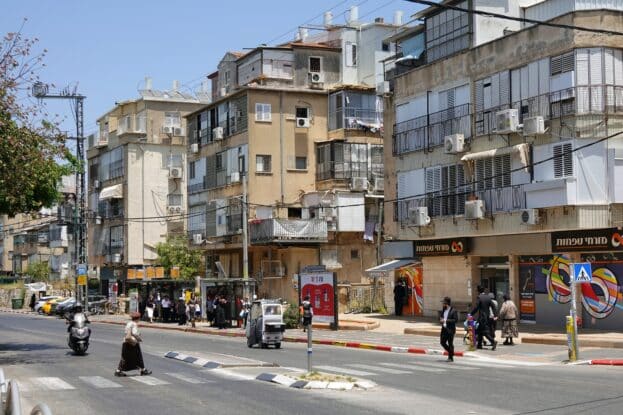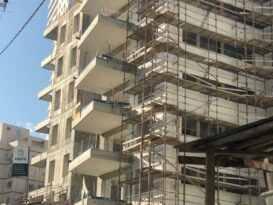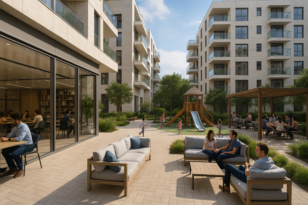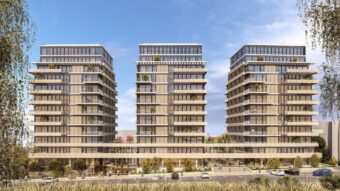A newly published report outlines the key challenges hindering urban renewal in Haredi neighborhoods, highlighting the foremost obstacle: the application of halachic laws that prohibit compelling apartment owners to participate in renewal projects, even with majority support. To overcome this, the report recommends various measures, including building stronger relationships between government professionals and influential rabbis within the Haredi community.
By Nimrod Buso, Nadlan Center
The Government Authority for Urban Renewal and the Institute for Haredi Strategy and Policy last week published a report aimed at accelerating urban renewal processes in Haredi cities and neighborhoods, focusing on Jerusalem, Bnei Brak, and Ashdod, where most Haredi neighborhoods are older and suitable for renewal processes.
The report found that the main obstacle currently facing the advancement of Pinui-Binui (eviction-reconstruction) projects in the Haredi community is the way “neighbor laws” are implemented according to halacha, in the rabbinical courts of the Haredi community. One proposed way to address this challenge is to strengthen ties between governmental urban renewal professionals and leading rabbis whose halachic rulings influence decisions in these courts.
“The growing need for housing units, as well as the desire of young Haredi couples to purchase housing within Haredi areas, makes urban renewal in older Haredi spaces one of the possible solutions to the housing crisis in the Haredi sector,” the report’s introduction states. “Increasing the stock of available housing units in desirable Haredi areas could provide an effective and optimal solution to the widening gap between high demand and low supply. This is compounded by the poor safety of existing buildings in these spaces, their lack of protection required during emergencies and war, and their vulnerability to earthquakes.”
Additionally, according to the report, there is high awareness within the Haredi public of the benefits inherent in urban renewal processes, and many community members would welcome advancing these initiatives in their neighborhoods. However, several unique obstacles to the Haredi community arise, besides the “usual” barriers common to urban renewal. The report categorizes these unique barriers into three types. The first is “halachic-religious barriers that stem from rights granted by halacha to residents in shared buildings and the integration of technological systems in new high-rise modern buildings, creating halachic challenges for Sabbath use.”
The second type of barrier is economic-planning, led by the widespread illegal building additions in older Haredi areas, “which increase the cost of compensation for residents or hinder agreement feasibility among them.” The third type is cultural-communal, “stemming from fear of the arrival of a new population whose lifestyle does not align with the local Haredi norms, possibly altering the neighborhood’s character after the implementation of an eviction-reconstruction plan, from rabbis’ involvement in decisions about joining such plans, and from the difficulty of separating from one’s original neighborhood during the interim period.”
Every apartment has “veto power” to block the project
Yet the most serious obstacle identified in the report is, as stated, the halachic neighbor law barrier. “Halacha generally rules that a resident in a shared building cannot impose his will on another resident, especially when it involves an extra financial burden on the others, unless it is a ‘necessary’ need,” it says. “The research shows that so far, rabbinical courts in the Haredi community have refrained from declaring that Pinui-Binui plans constitute a necessary need that justifies imposing the majority’s will on a dissenting tenant. This reveals a real gap between Israeli law and halacha as practiced in Haredi courts regarding residents’ ability to compel their neighbors.”
“The research shows that so far, rabbinical courts in the Haredi community have refrained from declaring that Pinui-Binui plans constitute a necessary need that justifies imposing the majority’s will on a dissenting tenant. This reality effectively grants ‘veto power’ to each apartment, allowing it to block project implementation.”
This reality effectively grants “veto power” to each apartment, enabling it to block projects from moving forward. It is also worth noting that in most parts of the Haredi community, turning to Israeli civil courts is prohibited, rendering extensive legislation on the “refusing tenant” issue irrelevant. As a solution to this barrier, the report proposes making urban renewal in general, and eviction-reconstruction plans in particular, into a “custom of the land”—that is, a prevalent and accepted practice in the Haredi community. “From a halachic standpoint, the more urban renewal processes in general and Pinui-Binui plans in particular become a regular part of both Israeli and Haredi spaces, halachic rulings on these matters will adopt the custom and reduce the veto right granted to dissenting tenants, thereby enabling enforcement on residents to join urban renewal plans,” the report states.
Therefore, the main recommendation of the document is to create success stories in older Haredi areas to “create a domino effect that will influence the perception of these plans as part of the ‘custom of the land’.” The report further states, “It is advisable to promote urban renewal plans in Haredi areas, even if initially on a limited scale, to establish these plans as a common practice in the community.”
“Creating communication channels between professionals and rabbis”
To reach a situation where a “first wave” of projects is advanced, the report outlines several steps. One of the main ones, as noted, is creating communication channels between public bodies and rabbis and community influencers.
“Most of the barriers to the implementation of Pinui-Binui plans in older Haredi areas are, to some extent, subject to halachic rulings made by rabbis and dayanim (rabbinic judges) in the Haredi community,” it states. “The research finds that in many cases, these rulings are made without full information about the needs and challenges these plans seek to address, as well as the implications of their implementation. Conversely, in many cases, planning authorities and officials are unaware of the full range of considerations underlying these decisions.” Therefore, it states, “Creating communication channels between professionals and rabbis could reduce information gaps, ease concerns stemming from lack of familiarity, and strengthen the sense of partnership in implementing Pinui-Binui plans.”
Another proposed step to make urban renewal a “custom of the land” is the proactive promotion of renewal complexes in the Haredi community by the Government Authority for Urban Renewal. “The authority will take upon itself to promote ten complexes in older Haredi areas, whether by serving as the planner and promoter of the plans or by assisting private developers in advancing them.”
Additional recommended steps include making knowledge about urban renewal plans accessible through special outreach frameworks for the Haredi community, increasing involvement of private developers familiar with the Haredi sector, planning flexibility, and more. It is recommended that systems be developed that reduce the concerns preventing Haredi individuals from deciding to join Pinui-Binui plans. Accessibility can be achieved by adapting information to the language commonly used in specific Haredi communities, expanding proactive public participation circles, and using media targeting the Haredi population.
This accessibility will include simplifying various procedures, providing detailed explanations of the stages and financial guarantees available to those joining eviction-reconstruction plans, directly addressing the obstacles preventing Haredi communities from joining such processes, and emphasizing the security and safety benefits.

Nadlan Center is Israel’s leading real estate news and knowledge platform in Hebrew, created for industry professionals. Founded by experts in the field, it delivers in-depth, up-to-date coverage on urban renewal, planning and construction, taxation, and housing policy — tailored to the needs of developers, investors, planners, and financiers. In addition to its widely read news content, Nadlan Center hosts major industry events, professional conferences, and training programs that support the growth and development of the Israeli real estate sector.
Learn more: https://www.nadlancenter.co.il







